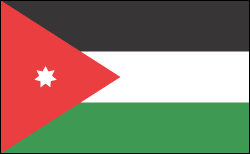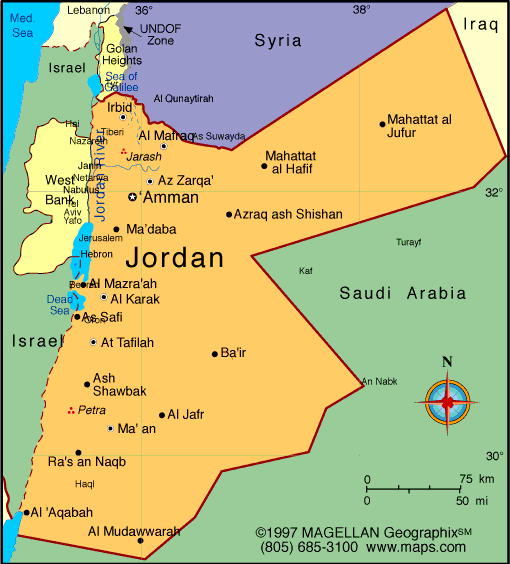JORDAN

Geography: The Middle East kingdom of Jordan is bordered on the west by Israel and the Dead Sea, on the north by Syria, on the east by Iraq, and on the south by Saudi Arabia. It is comparable in size to Indiana. Arid hills and mountains make up most of the country. The southern section of the Jordan River flows through the country.
Government: Constitutional hereditary monarchy.
History: In biblical times, the country that is now Jordan contained the lands of Edom, Moab, Ammon, and Bashan. Together with other Middle Eastern territories, Jordan passed in turn to the Assyrians, the Babylonians, the Persians, and, about 330 B.C. , the Seleucids. Conflict between the Seleucids and the Ptolemies enabled the Arabic-speaking Nabataeans to create a kingdom in southeast Jordan. In A.D. 106 it became part of the Roman province of Arabia and in 633–636 was conquered by the Arabs. In the 16th century, Jordan submitted to Ottoman Turkish rule and was administered from Damascus. Taken from the Turks by the British in World War I, Jordan (formerly known as Transjordan) was separated from the Palestine mandate in 1920, and in 1921, placed under the rule of Abdullah ibn Hussein.
In 1923, Britain recognized Jordan's independence, subject to the mandate. In 1946, grateful for Jordan's loyalty in World War II, Britain abolished the mandate. That part of Palestine occupied by Jordanian troops was formally incorporated by action of the Jordanian parliament in 1950. King Abdullah was assassinated in 1951. His son Talal, who was mentally ill, was deposed the next year. Talal's son Hussein, born on Nov. 14, 1935, succeeded him.
Government: Constitutional hereditary monarchy.
History: In biblical times, the country that is now Jordan contained the lands of Edom, Moab, Ammon, and Bashan. Together with other Middle Eastern territories, Jordan passed in turn to the Assyrians, the Babylonians, the Persians, and, about 330 B.C. , the Seleucids. Conflict between the Seleucids and the Ptolemies enabled the Arabic-speaking Nabataeans to create a kingdom in southeast Jordan. In A.D. 106 it became part of the Roman province of Arabia and in 633–636 was conquered by the Arabs. In the 16th century, Jordan submitted to Ottoman Turkish rule and was administered from Damascus. Taken from the Turks by the British in World War I, Jordan (formerly known as Transjordan) was separated from the Palestine mandate in 1920, and in 1921, placed under the rule of Abdullah ibn Hussein.
In 1923, Britain recognized Jordan's independence, subject to the mandate. In 1946, grateful for Jordan's loyalty in World War II, Britain abolished the mandate. That part of Palestine occupied by Jordanian troops was formally incorporated by action of the Jordanian parliament in 1950. King Abdullah was assassinated in 1951. His son Talal, who was mentally ill, was deposed the next year. Talal's son Hussein, born on Nov. 14, 1935, succeeded him.

Map of Jordan
Ruler: King Abdullah
II (1999)
Prime Minister: Abdullah Ensour (2012)
Land area: 34,286 sq mi (88,802 sq km);
total area: 34,495 sq mi (89,342 sq km) excludes West
Bank
Population (2012 est.): 6,508,887
(growth rate: -0.965%); birth rate: 26.52/1000; infant mortality rate:
15.83/1000; life expectancy: 80.18
Capital and largest city (2009 est.):
Amman, 1.088 million
Monetary unit: Jordanian dinar
National name: Al-Mamlaka al-Urduniya
al-Hashimiyah
Languages:
Arabic (official), English
Ethnicity/race:
Arab 98%, Circassian 1%, Armenian 1%
Religions:
Islam (Sunni) 92%, Christian 6% (mostly Greek
Orthodox), other 2%
National Holiday:
Independence Day, May 25
Literacy rate: 92.6% (2010 est.)
Economic summary: GDP/PPP (2011 est.):
$37.37 billion; per capita $6,000. Real growth rate: 2.5%.
Inflation: 6.4%. Unemployment: 12.3% official rate;
unofficial rate is approximately 30% (2011 est.). Arable land:
3.32%. Agriculture: citrus, tomatoes, cucumbers, olives, strawberries, stone fruits; sheep, poultry, dairy. Labor force: 1.771 million;
services 77.4%, industry 20%, agriculture 2.7% (2007 est.).
Industries: clothing, fertilizers, potash,
phosphate mining, pharmaceuticals, petroleum refining, cement, inorganic
chemicals, light manufacturing, tourism. Natural resources:
phosphates, potash, shale oil. Exports: $8.066 billion (2011 est.): clothing, phosphates, fertilizers, potash, vegetables, pharmaceuticals. Imports: $14.01 billion
(2011 est.): crude oil, machinery, transport
equipment, iron, cereals. Major trading partners: U.S.,
Iraq, India, Saudi Arabia, China, Germany, Egypt, Lebanon, Italy (2011).
Communications: Telephones: main lines
in use: 485,000 (2009); mobile cellular: 6.62 million (2009).
Broadcast media: radio and TV dominated by the
government-owned Jordan Radio and Television Corporation (JRTV) that
operates a main network, a sports network, a film network, and a
satellite channel; first independent TV broadcaster aired in 2007;
international satellite TV and Israeli and Syrian TV broadcasts are
available; roughly 30 radio stations with JRTV operating the main
government-owned station; transmissions of multiple international radio
broadcasters are available (2007). Internet hosts: 49,083 (2010).
Internet users: 1.642 (2009).
Transportation: Railways: total: 507 km
(2010). Highways: total: 7,891 km; paved: 7,891 km; unpaved: 0
km (2009). Ports and terminals: Al 'Aqabah. Airports: 18
(2012).
International disputes: 2004
Agreement settles border dispute with Syria pending demarcation.
-------------------- o --------------------
No comments:
Post a Comment